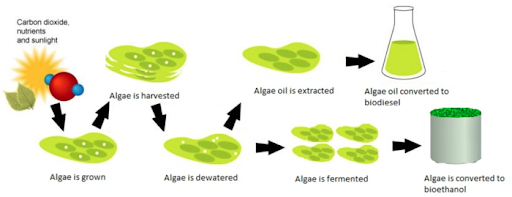In news– Reliance Industries Ltd of India has recently released a short video on social media platform Instagram highlighting the cutting-edge algae-to-fuel technology it has developed.
Key updates-
- The company has been successfully running large algae raceway ponds the last five years at their facility near Jamnagar, to convert sunshine, CO2 and seawater into bio-oil.
- It also displayed the utilisation of catalytic hydrothermal liquefaction technology to convert algae biomass to oil.
- Under this process, water is used as solvent under high temperature and pressure to extract oil from the biomass.
- The benefits of this technology include direct utilisation of wet biomass without any need for drying and conversion of every organic fragment of biomass into oil and without any wastage.
- At the global level, oil and gas giant ExxonMobil partnered with Viridos (formerly Synthetic Genomics) to commercialise algal biofuels.
Algae biofuels-
- Algae can synthesise large volumes of oil (20 times more than that of mustard per acre), grow fast (10 times quicker than terrestrial plants) and capture carbon dioxide (CO2).
- Microalgae are excellent at converting CO2 and sunlight into oil-rich biomass, especially when compared to land-based crop plants like oil palm and soy.
- By adapting microalgae to function as cell factories producing energy-dense oils that can easily be refined into renewable diesel and jet fuel, we can reduce greenhouse gas emissions by 70 per cent.

- Algae are sometimes grown to make algae biofuels, which make up the third generation of biofuels. Many types of algae can be used and processed to become a biofuel.
- Biofuel is a fuel made from living things, or the waste of a living thing, also known as biomass.
- The algae oils can be converted to biodiesel and the remaining material can be used to create bioethanol.
The challenges-
The major challenges associated with algae biofuel include-
- Large water requirements.
- High cost of growth nutrients.
- Expensive biomass harvesting, and
- Difficult oil extraction from algae cells.
- Producing a kilogram of biodiesel requires 3.73 tonnes of water, 0.33 kg of nitrogen and 0.71 kg of phosphate.
- Additionally, the energy cost of extracting oil from algae biomass is 10 times higher than the energy cost of extracting soybean oil.
















